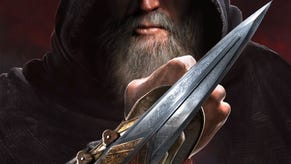Assassin’s Creed 3: revolution or deja vu?
Stace Harman speaks to Ubisoft’s Alex Hutchinson and Jonathan Cooper to find out what tricks new protagonist Connor has up his sleeve to impress those jaded by the annual release cycle of one of gaming’s biggest brands.
The wheel turns, the seasons pass and another Assassin’s Creed game hits the shelves. In the past, I’ve been critical of Ubisoft’s decision to subject its franchise to an annual release schedule cycle, while at the same time I’ve had to acknowledge the futility of such a position: Assassin’s Creed is one of the industry’s mega-brands, with each entry in the series selling millions and garnering strong critical reception. What’s more, so long as Ubisoft can continue to create compelling experiences, its flexible fiction could conceivably support a decade’s worth of releases.
Sitting down with Assassin’s Creed 3 creative director Alex Hutchinson and animation director Jonathan Cooper, it’s evident that they’ve addressed this subject many times before. They seem bemused by it.
“I said this at the GDC talk in Germany a few months back and I don’t know why people were weird about it but it’s just about quality: if it’s really good it will come out as often as we can make but if it’s crap, then it’s a problem,” Hutchinson sums-up.
Certainly, none of the Assassin’s games can be accused of being crap. The first is perhaps the weakest link, falling victim to both its own hype and a lack of variety in its core game mechanics but the series took off with the introduction of Ezio in 2009’s Assassin’s Creed 2. While the quality dipped a little with last year’s Assassin’s Creed Revelations, it still provided a solid conclusion to an aged Ezio’s story.
With the change of time period and grand backdrop of the American Revolution, Assassin’s Creed 3 is set to reinvigorate the series, but it’s not just the time, place and central character that have changed. The suggestion that the fifth game in the canon may simply be piggy-backing the expanded game systems of Brotherhood and Revelations is met by an emphatic shake of the head by Hutchinson and a firm rebuttal.
“There’s actually more new stuff than stuff brought forward from the previous games,” Hutchinson insists. “We took core concepts of the assassin, open world, combat and navigation but everything else is new and to get that opportunity is super-rare: we get to do pretty much whatever we want and have a budget, which is amazing.”
Hutchinson goes on to list the areas that have either received an overhaul or are entirely new, name-checking navigation, controls, the weather system, combat, naval warfare, two dozen species of animals, and hunting before Cooper interjects.
“The mission structure is a new, too and that makes a big difference. While you always know where your main mission is, every other mission can be played concurrently, so your log book accumulates all of the other side activities that you can do.
“There’s a bigger difference between this one and Assassin’s Creed 2 than there was between AC2 and AC1. We’ve been working on this for around 3 years, after AC2 we started working on AC3 and other studios did the other sequels. So, they went in one direction and we went in another.”
The end result, based on several hours play across multiple preview sessions, is a game that feels more open-world than any previous iteration. The new mission structure contributes significantly to this, as does the strong presence of life outside the city. Where previously the space in between cities served as a pleasant enough way to while away time between story missions, the frontier now asserts itself as a fully-featured playground where around a third of the critical-path missions take place and some of the games most colourful characters come into their own.
The combat, too, has benefitted from several improvements and while counters are still incredibly effective, there’s now more variety in how Connor behaves based on the type of counter and the enemy archetype. As Hutchinson explains, “The bigger challenge for us could be with the hardcore fans who want to play in the same way that they always have ... we were watching people play and it’s clear that trying to use the same techniques as they did in Revelations simply won’t work.”
Of course, the hardcore will quickly adapt to new strategies that include the ability to use contextual attacks thanks to Connor’s newfound awareness of his surroundings. The ability to throw assailants over Connor’s shoulder and off a cliff or, when backed against a wall, to launch Connor from it into his attackers provide neat touches, while the lack of lock-on and the ability to build momentum during combat nudges players toward a more offensive, flowing style of combat.
The environmental awareness combined with Connor’s 8,000 frames of animation allow for some emergent game play moments. I relay a story to Cooper about what appeared to be a bug, as one of Connor’s combat animations took him and his unsuspecting victim over a cliff, but Cooper’s initial wince turns to a smile as I conclude that Connor had caught himself on a rocky outcropping and clambered to safety, “I’m really glad to hear that. I thought that story was going to end differently,” he admits.
I’ve not yet played enough of Assassin’s Creed 3 to categorically state that it’s the best entry in the series, but I’m fully expecting the reviews to find that to be the case. The narrative peaks and troughs are more pronounced thanks to the contrast between city life and being home on the range, which lends a welcome juxtaposition of Connor’s downtime to the explosive set pieces. The added depth of freedom afforded by his expanded move set, both in and out of combat, better enforces the feeling of playing the role of a master assassin, while Connor’s mixed heritage and conflicting feelings about his background make him a more interesting protagonist than both the smart-mouthed Ezio and stoic Altair.
Some people will remain unconvinced, of course, feeling that Ubisoft is milking dry its most prized franchise and those people can vote with their wallets by refusing to buy this latest entry in what will surely remain an annual franchise. However, those with a penchant for action-adventure titles, even those that may have previously cast aside the assassin’s cowl due to cynicism or apathy, should take a closer look. Refusing to do so on principle is just cutting off your nose with a hidden wrist blade to spite your face.
Assassin’s Creed 3 launches on PS3 and 360 on October 30 in the US and October 31 in Europe, on PC on November 20 and 23, and on Wii U on November 18 and 30.










